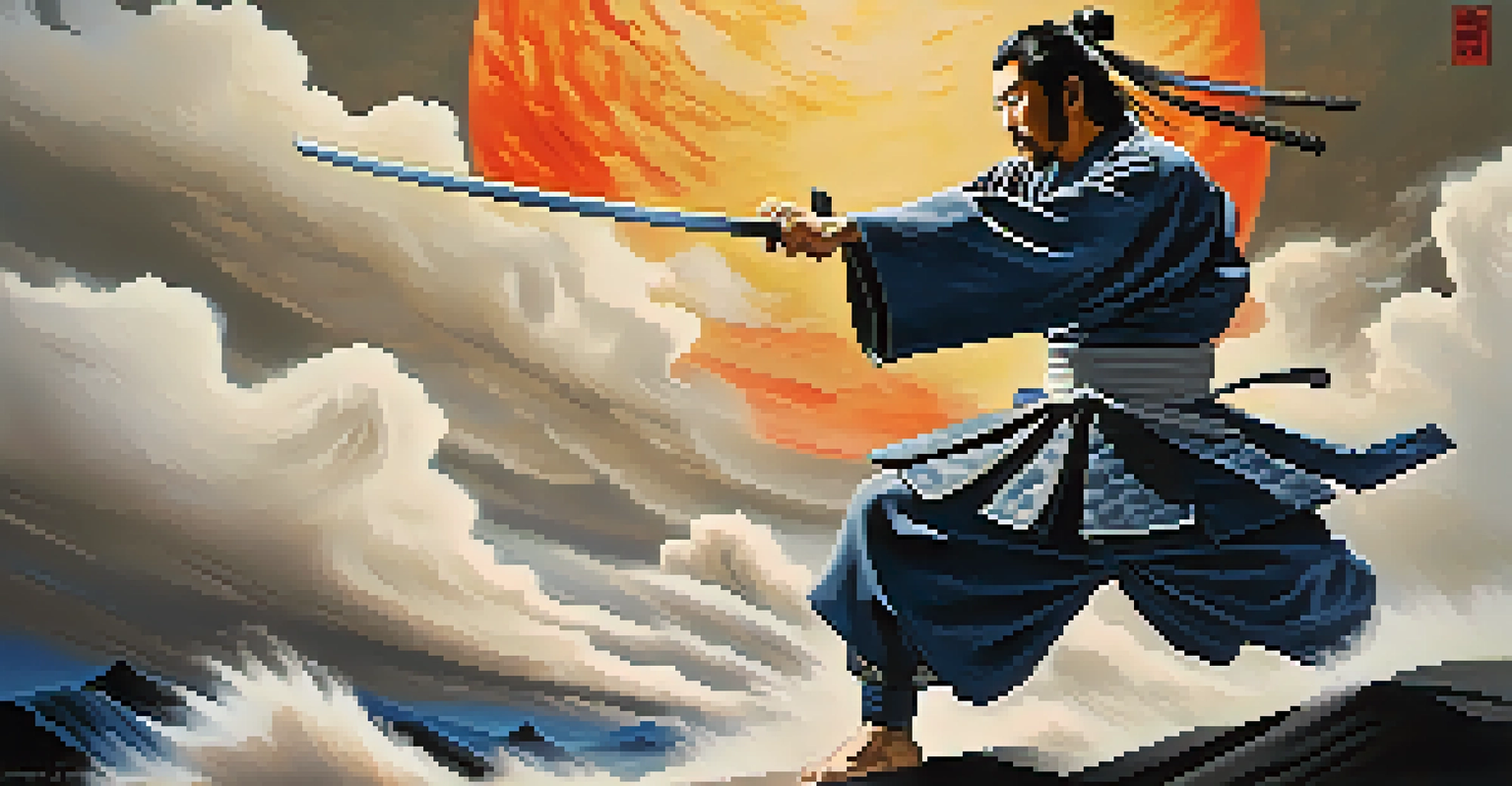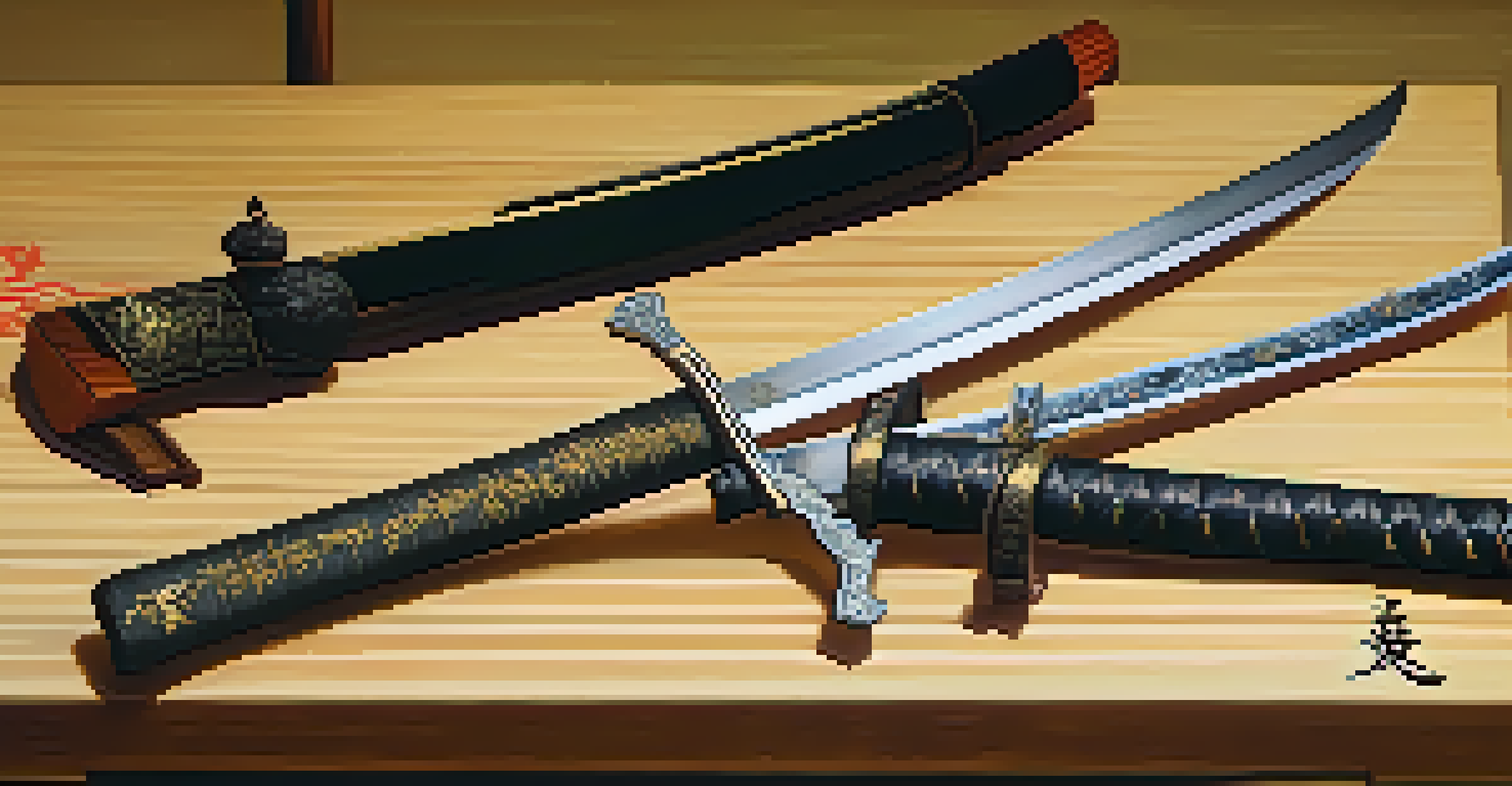Miyamoto Musashi: The Legendary Samurai and His Techniques

Who Was Miyamoto Musashi? A Brief Overview
Miyamoto Musashi is perhaps the most famous samurai in Japanese history, renowned for his unmatched skills in swordsmanship and strategy. Born in 1584, he became a master swordsman by the time he reached his twenties, engaging in numerous duels that showcased his extraordinary talent. Musashi was not just a warrior; he was also a philosopher and artist, reflecting a deep understanding of life through his works and teachings. His journey from a wandering swordsman to a legendary figure is a testament to his relentless pursuit of mastery.
The ultimate aim of the art of war is not to vanquish the enemy, but to conquer the enemy's mind.
His life was marked by a series of legendary duels, the most famous being against Sasaki Kojiro, another master swordsman of the time. This fight, characterized by Musashi's unconventional tactics and psychological warfare, solidified his reputation. Musashi’s philosophies extended beyond combat; they influenced various aspects of Japanese culture, including arts and martial practices. Even today, his name evokes a sense of respect and admiration, embodying the spirit of the samurai.
Musashi's legacy is not just about his victories but the principles he lived by. His teachings, especially those found in his book 'The Book of Five Rings,' continue to resonate with martial artists and leaders alike. Through his life and work, Musashi teaches us about the importance of adaptability, discipline, and the pursuit of personal excellence.
The Philosophy Behind Musashi's Techniques
At the core of Musashi's techniques lies a profound philosophy that emphasizes the importance of understanding oneself and the opponent. He believed that true mastery comes not just from physical skill but also from mental acuity and emotional control. Musashi's approach can be likened to a dance; one must be attuned to the rhythm of the conflict, responding fluidly to changes and challenges. This holistic view of combat extends beyond the battlefield to life itself.

Musashi outlined his strategies in 'The Book of Five Rings,' where he emphasizes concepts like timing, precision, and the mental state of the warrior. He encourages practitioners to cultivate a mindset that is both calm and alert, enabling them to respond effectively to any situation. For Musashi, the duel was not just a test of swords but a battle of wits, where understanding and adaptability are paramount. This philosophy is as relevant today as it was in the 17th century, influencing various fields beyond martial arts.
Musashi's Duality as Warrior and Artist
Miyamoto Musashi exemplified the balance of strength and sensitivity, influencing various art forms and inspiring artists to seek depth in their work.
This balance of mental and physical preparation is essential for anyone seeking to achieve mastery in their field. Whether in sports, business, or personal endeavors, Musashi's teachings remind us that success is not solely based on skill but also on the ability to adapt and learn. Embracing this duality can lead to greater achievements and a deeper understanding of one’s craft.
The Two-Sword Technique: Niten Ichi-ryū
One of Musashi's most notable contributions to martial arts is his two-sword technique known as Niten Ichi-ryū. This method involves wielding both a katana and a shorter sword simultaneously, allowing for a versatile and unpredictable fighting style. Musashi developed this technique after years of experimentation and reflection, recognizing that dual-wielding could provide a strategic advantage in combat. It's like playing chess with two pieces instead of one; the options for attack and defense multiply.
It is difficult to understand the universe if you only study one planet.
The core of Niten Ichi-ryū is not just about the physical act of fighting but also about the mindset of the fighter. Musashi taught that controlling the distance between oneself and the opponent is crucial, as it allows for both offensive and defensive maneuvers. This technique requires rigorous practice and an understanding of timing and rhythm, enabling the swordsman to strike while simultaneously defending against incoming attacks. It's a dance of sorts, where each movement must be precise and intentional.
Musashi's two-sword technique continues to be studied and practiced in modern martial arts, demonstrating its enduring relevance. Practitioners today appreciate how it enhances their adaptability and creativity in combat situations. Just as Musashi blended his weapons, modern warriors blend traditional techniques with contemporary strategies, proving that innovation is key in any discipline.
Musashi's Influence on Japanese Culture
Miyamoto Musashi's impact extends far beyond the realm of martial arts; he has significantly influenced Japanese culture as a whole. His philosophy and techniques have permeated various art forms, including painting, calligraphy, and even theater. Musashi's life story and teachings inspire artists and creators, encouraging them to seek depth and understanding in their work. His duality as a warrior and an artist exemplifies the balance of strength and sensitivity, which is a hallmark of Japanese aesthetics.
In literature, Musashi's legacy is immortalized in novels and films that depict his life and philosophies. Works like Eiji Yoshikawa's 'Musashi' have popularized his story, bringing his teachings to a broader audience. These narratives not only celebrate his martial prowess but also delve into his philosophical insights, making them relatable to people from all walks of life. The themes of perseverance, resilience, and the quest for self-improvement resonate deeply within the human experience.
Timeless Lessons for Modern Practitioners
Musashi's teachings on adaptability, discipline, and self-reflection provide valuable insights that apply to martial arts, business, and personal growth.
Musashi's influence can also be seen in modern martial arts disciplines, where his techniques and philosophies are integrated into training regimens. Schools of martial arts often reference Musashi’s strategies, encouraging students to adopt a mindset of continuous learning and adaptation. This cultural legacy ensures that Musashi's teachings remain relevant, inspiring new generations to explore the deeper meanings of mastery and personal growth.
Lessons from Musashi for Modern Practitioners
The teachings of Miyamoto Musashi offer timeless lessons for modern practitioners, regardless of their field. One of the key takeaways is the importance of adaptability; Musashi believed that the ability to adjust one’s strategy in response to circumstances is essential for success. This principle can be applied not only in martial arts but also in business, sports, and everyday challenges. Just as Musashi adjusted his techniques to suit different opponents, we too must remain flexible in our approaches to life.
Another crucial lesson from Musashi's life is the value of discipline and perseverance. He dedicated countless hours to honing his craft, emphasizing that mastery is a journey rather than a destination. This relentless pursuit of excellence encourages individuals to embrace hard work and continuous improvement. In a world where instant gratification is often sought, Musashi's commitment reminds us that true success requires patience and dedication.
Lastly, Musashi teaches us the importance of self-reflection and understanding one's own motives. He believed that to master any skill, one must first understand themselves. This introspective approach fosters personal growth and ensures that our actions align with our values and goals. By integrating these lessons into our lives, we can navigate challenges with greater clarity and purpose.
Musashi's Legacy in the Martial Arts Community
Miyamoto Musashi's legacy is deeply embedded in the martial arts community, where his techniques and philosophies continue to inspire practitioners worldwide. Schools dedicated to his teachings, such as Niten Ichi-ryū, preserve and promote his methods, ensuring that future generations can learn from his wisdom. These schools emphasize not only the physical aspects of combat but also the philosophical underpinnings that Musashi championed. This holistic approach fosters well-rounded martial artists who embody both skill and character.
Moreover, Musashi's story has become a source of inspiration for martial artists seeking to deepen their understanding of combat and life. His emphasis on self-discipline, adaptability, and introspection resonates with those who aspire to grow both on and off the mat. Many modern martial artists study Musashi's writings as part of their training, applying his insights to enhance their practice. The connection between Musashi's teachings and contemporary martial arts illustrates the enduring relevance of his philosophy.
Enduring Legacy in Martial Arts
Musashi's philosophies and techniques continue to inspire martial artists worldwide, promoting a holistic approach that combines skill with character development.
In tournaments and training sessions, Musashi's influence can be felt in the way practitioners approach their craft. The principles he espoused—timing, distance, and psychological strategy—are fundamental to successful competition. As martial artists honor his legacy, they also contribute to a rich tradition of learning and growth, ensuring that Musashi's spirit continues to thrive in the heart of the martial arts community.
Conclusion: The Enduring Spirit of Miyamoto Musashi
In conclusion, the life and teachings of Miyamoto Musashi offer profound insights that extend beyond his time and discipline. His journey as a warrior, artist, and philosopher serves as a reminder of the multifaceted nature of mastery. Musashi’s ability to blend physical skill with mental acuity provides a blueprint for anyone striving for excellence in their field. The principles he espoused—adaptability, discipline, and self-awareness—remain as relevant today as they were centuries ago.
Musashi’s legacy is not just about his martial prowess but also about his ability to inspire a way of thinking that transcends traditional boundaries. His teachings encourage individuals to seek continuous growth, embrace challenges, and remain open to new ideas and perspectives. This spirit of inquiry and resilience is what keeps Musashi's essence alive in today's world, resonating with those who dare to pursue their passions wholeheartedly.

As we reflect on Musashi’s contributions, let us carry forward his lessons in our own lives. Whether in martial arts or any other endeavor, embracing the spirit of Miyamoto Musashi can guide us toward greater self-discovery and mastery, ensuring that his legacy endures for generations to come.